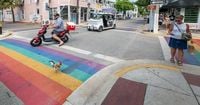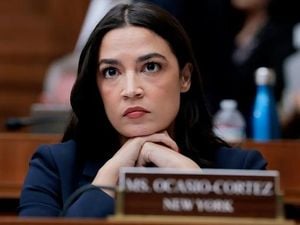In a swirl of controversy, Florida has become the latest battleground in the ongoing debate over public displays of LGBTQ pride, as state and federal officials order the removal of rainbow crosswalks in cities across the Sunshine State. The directive, which has ignited passionate responses from local leaders, activists, and residents, centers on the intersection of public safety, political symbolism, and the enduring legacy of the Pulse nightclub massacre.
On the evening of August 23, 2025, rainbow-colored crosswalks appeared outside two Florida Department of Transportation (FDOT) offices in Broward County—one at the Broward Operations Center in Fort Lauderdale, the other at FDOT District 4 in Oakland Park. Painted alongside the vibrant stripes were the word “Pulse” and a heart, a clear tribute to the 49 lives lost in the 2016 mass shooting at Orlando’s Pulse nightclub. The message, “Pulse — you will not erase us,” was scrawled on the pavement, signaling defiance against recent state actions.
These acts of protest came on the heels of a dramatic move by FDOT: the overnight removal of a rainbow crosswalk installed in 2017 outside the Pulse nightclub. The crosswalk, a symbol of remembrance and hope, had become a focal point for the LGBTQ community and its allies. Its sudden erasure, performed under cover of darkness in the early hours of August 21, left many in Orlando and beyond reeling.
The state’s action was not an isolated incident. In letters sent on August 21, FDOT ordered cities including Miami Beach, Fort Lauderdale, and Key West to remove their rainbow crosswalks by early September or risk losing state funding. The agency cited a June 2025 memo prohibiting surface art associated with political ideologies on crosswalks and sidewalks, referencing concerns about driver distraction and road safety.
Governor Ron DeSantis amplified the message on X (formerly Twitter), declaring, “We will not allow our state roads to be commandeered for political purposes.” The governor’s stance echoed that of U.S. Transportation Secretary Sean Duffy, who in a July 1 directive called for states to eliminate “distractions” from roadways. “Roads are for safety, not political messages or artwork,” Duffy stated, urging governors to ensure intersections and crosswalks remain free of non-standard markings. The Federal Highway Administration reinforced this position, telling The Associated Press that states receiving federal funds are responsible for identifying and mitigating roadway hazards.
FDOT itself defended the removals, stating in a release, “Our agency has a duty to ensure the safety and consistency of public roadways and transportation systems. That means ensuring our roadways are not utilized for social, political, or ideological interests.”
The backlash was immediate and fierce. Demonstrators in Orlando gathered to protest the removal, chanting, “Whose streets? Our streets.” Miami-Dade Mayor Daniella Levine Cava voiced her outrage, saying, “I am outraged by the State of Florida’s decision to forcefully remove Pride crosswalks — symbols of love, support, and unity in our communities. These vibrant installations are more than paint on pavement. They reflect the values we hold dear in Miami-Dade: respect, appreciation of fellow neighbors, and the fundamental right to live and love openly.”
Miami Beach Commissioner Alex Fernandez echoed these sentiments, telling WSVN-TV, “People from around the world come to Miami Beach because we are a beacon of safety, of inclusivity, and that’s what that rainbow sidewalk symbolizes.” Fernandez added, “We need to resist this action. We need to protect the individuality of our community, the freedom and the safety that our rainbow crosswalk expresses to the world.”
Fort Lauderdale Mayor Dean Trantalis was even more blunt, calling the removal order “a very transparent attempt to try to eliminate the visibility of the LGBTQ community.” He continued, “To come now and to strip this away from people when it’s a safe crosswalk sends a message of insecurity, sends a message of intolerance to people that need to be supported and elevated more than ever.”
In Orlando, the response was creative and collective. About 100 residents gathered on August 21 to restore the erased crosswalk using chalk, temporarily bringing the rainbow back to Orange Avenue near the former Pulse nightclub. Dallas Perdue, a local resident, told WFTV, “I was just fixing what shouldn’t have been…painted over in the first place.” State Rep. Anna Eskamani, who joined the effort, wrote on X, “It was never a political statement, and caring about people of all backgrounds is not meant to be a political statement. And, more visible crosswalks help to increase visibility and safety too.”
Orlando City Commissioner Patty Sheehan accused FDOT of making a “political statement” targeting the LGBTQ community, calling the paving over of the rainbow crosswalk “a slap in the face.” Pulse shooting survivor Brandon Wolf expressed his pain on social media, writing, “The cowards threatened by our lives should feel lucky they didn’t have to bury the ones they love — then watch the state come & bury their memory.”
State Senator Carlos Guillermo Smith, the first openly gay Latino elected to the Florida Legislature, condemned the state’s actions and praised residents for their resilience. “We turned out, painted the neighborhood with even more rainbows, and reminded everyone that love always wins,” he told Newsweek. Smith also called the state’s removal “an act of vandalism” and disrespectful to the families and survivors of the Pulse massacre.
The controversy has drawn national attention, with some seeing Florida as the vanguard in what are often described as culture wars. Rand Hoch, founder of the Palm Beach County Human Rights Council, said, “They’re basically blackmailing municipalities, counties and states by saying if you don’t do this, we’re going to withhold funding. It’s absolutely ridiculous.”
Not all cities are acquiescing quietly. St. Petersburg requested exemptions for several street art projects, including a rainbow intersection and a Black Lives Matter mural, but state officials denied the request. “While these specific art murals will be removed, the spirit of what makes St. Pete a special place can’t be suppressed by legislative fiat, and we will find meaningful ways to express our shared values,” Mayor Kenneth Welch said in a statement to The Associated Press.
Elsewhere, officials in Lexington, Kentucky, made clear they have no plans to remove their rainbow crosswalks, citing compliance with federal safety requirements. “We feel it meets the federal requirements regarding crosswalks,” said city spokesman Craig Cammack.
The debate in Florida, however, is far from over. As the September deadlines approach, city leaders in Miami Beach, Fort Lauderdale, Key West, and beyond are weighing legal challenges and public appeals. The question at the heart of the matter—whether public streets can be canvases for community values or must remain neutral zones—remains unresolved, but the voices raised in protest are determined not to let the memory of Pulse, or the symbols of pride, be erased without a fight.





